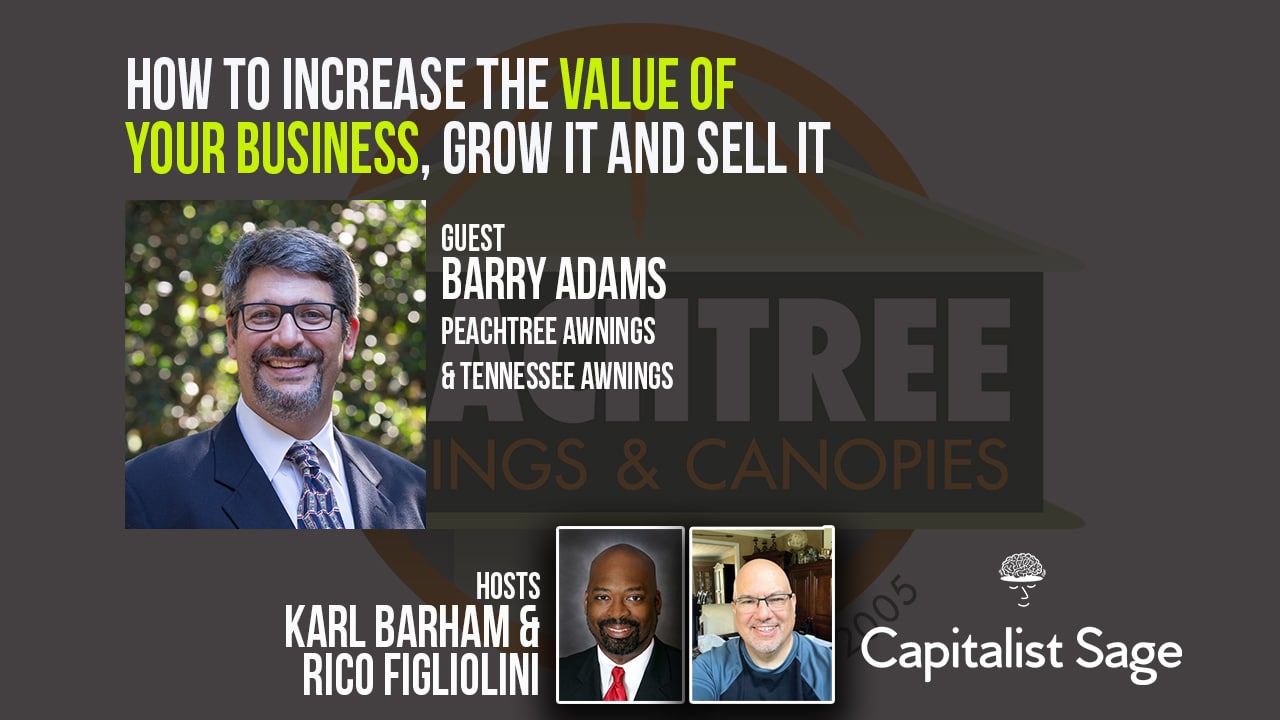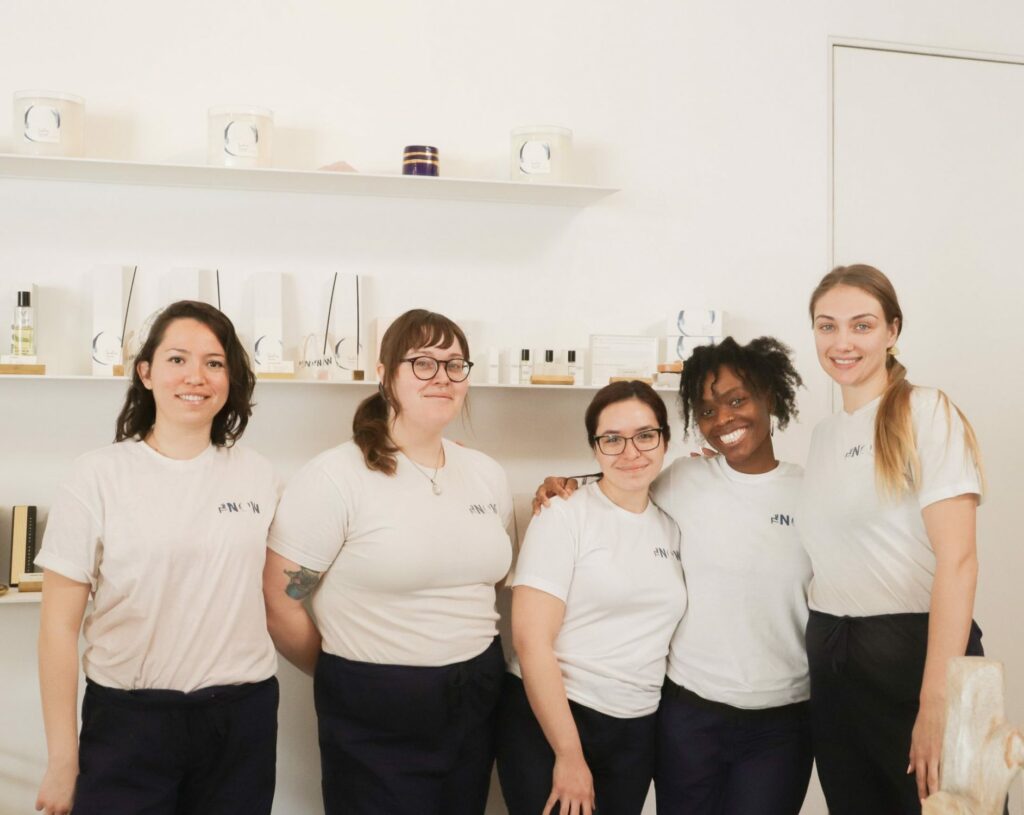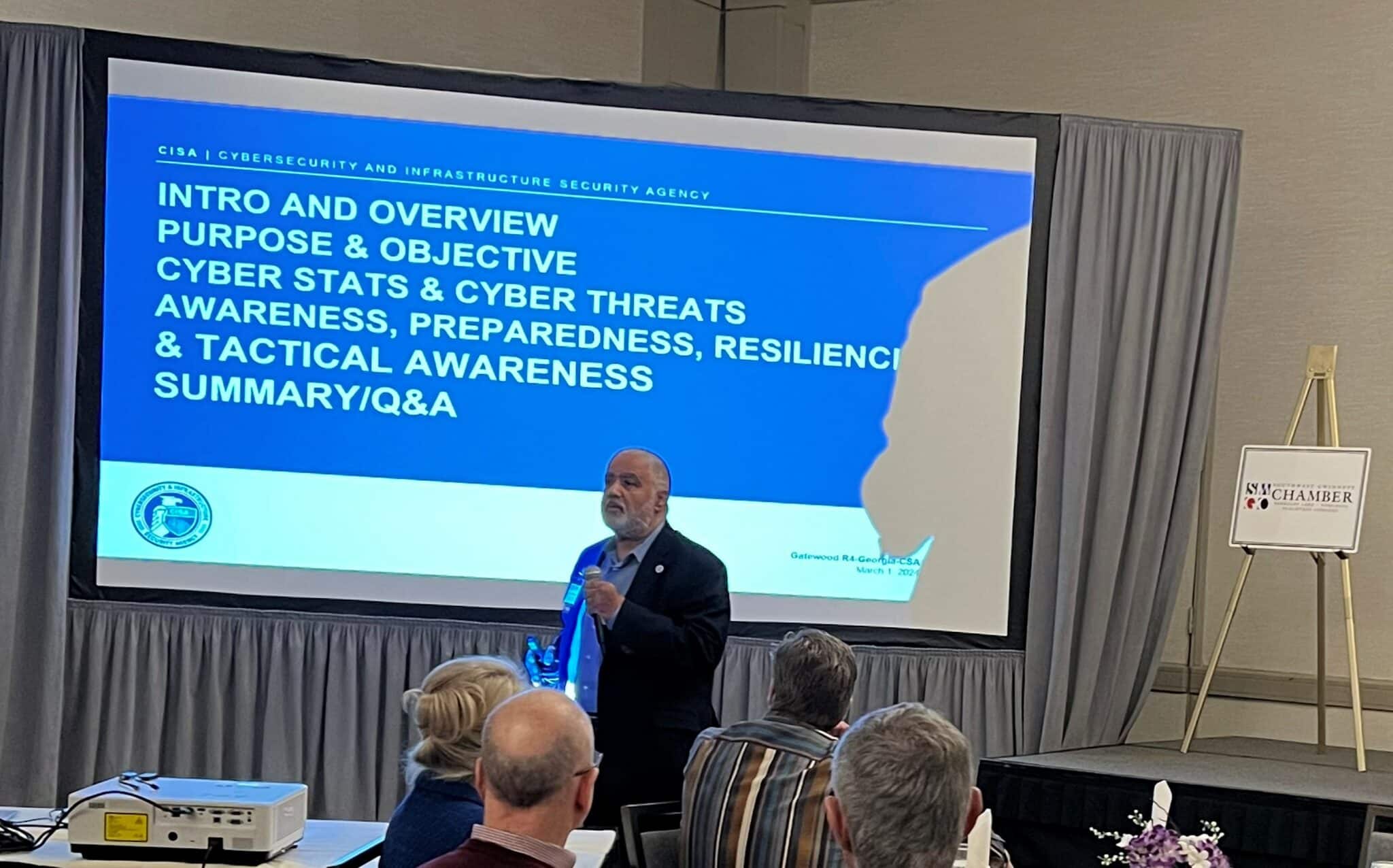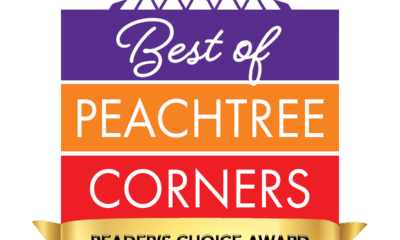Business
Choosing, planning and Growing a Business, with Barry Adams, owner of Peachtree Awnings
Published
3 years agoon

What to consider when starting a business. How to choose the business for you. How to consider when planning your first three years of business. In this episode of the Capitalist Sage Podcast, Karl Barham and Rico Figliolini talk with Barry Adams, founder, and owner of Peachtree Awnings and Tennessee Awnings about his experience in the business world. Barry shares some insightful tips and tricks to help any small or large business owner through their journey through entrepreneurship.
Related Links:
Websites:
https://www.peachtreeawnings.com
http://www.tennesseeawnings.com
Facebook:
Peachtree Awnings
Tennessee Awnings
Phone Number: (770) 409-8372
Where to find the topic in the show – Timestamp:
[00:00:30] – Intro
[00:01:58] – About Barry and Peachtree Awnings
[00:07:36] – Learning from Experience
[00:10:20] – Making Business Decisions
[00:12:26] – Impact of a Formal Education
[00:14:59] – Business Impact of COVID
[00:17:31] – How to Make Your Business Thrive
[00:23:08] – Making a Business Plan
[00:25:31] – Learning New Things
[00:30:19] – Looking to the Future
[00:32:44] – Innovations
[00:34:17] – Growing Through People
[00:36:55] – Helping the Community
[00:41:23] – Closing
Podcast Transcript:
Karl: [00:00:30] Welcome to the Capitalist Sage Podcast. We’re here to bring you advice and
tips from seasoned pros and experts to help you improve your business. I’m Karl Barham with
Transworld Business Advisors and my co-host is Rico Figliolini with Mighty Rockets Digital
Marketing and the publisher of the Peachtree Corners magazine. Hey Rico, how’re you doing
today?
Rico: [00:00:49] Hey Karl. Pretty good, beautiful day. Thank God the power’s on versus last
week. Before we get into the show, let me introduce our lead sponsor Hargray Fiber. They’re a
great Southeast company that works in fiber optics and IT management working to make you a
business sound and be able to communicate with the rest of the world. Whether it’s, you’re at
home teleworking employees or in office, cause COVID is still going on, right? So many different
people are working it differently. And here in Peachtree Corners, they’re very involved. They’re
involved with Curiosity Lab that Peachtree Corners. They’re involved with the city. They’re really
in tune with the community and that’s how they are with every community they’re in. So unlike
the cable guy, these guys are here right in the community that they’re working in. If you need
them, they’re there for you. So any business, whether you’re small or enterprise size, they can
work the systems for you, provide the office tools that you can work with as well. So visit them at
HargrayFiber.com and find out a little bit more about our lead sponsor. We’re thankful for them.
So cool.
Karl: [00:01:58] Sounds good. Well, thank you Rico for introducing our sponsor. Today’s guest is
Barry Adams, CEO, and founder of Peachtree Awnings. Local, small business that’s located
here in Gwinnett County and one of the business leaders in the community that we’re glad to
have as a guest with us today. Hey Barry, how are you doing?
Barry: [00:02:20] Great Karl. It’s good to be here.
Karl: [00:02:23] Good. Why don’t you introduce yourself a little bit? Tell a little bit about yourself
and what you do.
Barry: [00:02:29] Yeah. I’m Barry Adams the owner of Peachtree Awnings and Canopies I own
the local shop and also Tennessee Awnings up in Nashville service and middle Tennessee up
in the Nashville area. So we are a manufacturer of custom commercial and residential awnings
of all shapes and sizes. We serve the local Atlanta area, but we go outside of Atlanta too. So
we’ve got a pretty good reach. And we’ve been in business for 15 years. I started the company
in 2005. And then acquired an existing awning company in Nashville in 2012. So I’ve had that
shop up there in Nashville for eight years now, and 15 years here in Atlanta. So it’s been a labor
of love. I can tell you that any small business owner, I think, would say the same thing is that,
you know, you do it and you do it because you really are passionate about your product or your
service and whatever you do. You gotta dig in everyday in kind of the same way.
Karl: [00:03:40] So I’m curious, did you grow up in a small business family? What was, what did
you do before?
Barry: [00:03:46] Well, that’s great question, Karl. Actually, my grandfather had the
entrepreneurial spirit because I think he had four or five businesses by the time he was in his
mid forties. A couple of restaurants to his name, ended up having a landfill. And this is all in the
Southern California area. And so he definitely had the entrepreneurial spirit. You know, my
mother’s side, my grandfather on my mother’s side owned a grocery store in the Southern part
of Illinois. And so he was a, both a farmer and a grocer. And so I think I come by it naturally, the
Apple doesn’t fall far from the tree. So it definitely was in my genes, I think, to be a small
business owner.
Karl: [00:04:33] So when you were deciding to start off, what were you considering and how did
you come to that decision? What were some of the factors that you considered?
Barry: [00:04:40] Yeah, I was, it was 2005 and I was in my MBA program, executive MBA
program at Kennesaw state and I knew I wanted to start a business and wasn’t sure exactly
what I wanted to do. I was working with a business consultant that was pointing me in different
directions. I ended up buying, actually buying a franchise business. I got close with several
businesses. I looked at sign businesses. I really tried to give myself a lot of green space, a lot of
greenfields to look at a lot of different businesses. I looked at non-invasive skin procedures. I
looked at a lot of different things and got very close with sign businesses, but I wanted
something a little bit more differentiated. And so they said, how about awnings? And I had never
thought about awnings, never had really even looked at awnings. But I’m an engineer by
education. And so the more I looked at it, I said, I think I can, I think I could do this because you
design the product that you end up building and installing. And so it fit my skillset particularly
well. And so there in January of 2005, we kind of set sail having never built an awning or never
installed an awning. I bought into a franchise business and they educated me about how to build
awnings and how to install awnings. We climbed that learning curve very, very, very fast. So it
was really a challenging time, that first three years of being in business. Of course, the
recession started at like two double ’09. So shortly after that it was, you know, it was a little bit of
tough sledding.
Rico: [00:06:27] Well, I’ve got to give a little testimonial shout out to Barry because I must have
been one of the first of the half dozen of regional clients that Barry had. And it was beautiful. I
think it was a summer. It was definitely a summer day. And you put in the awning that I still have
15 years later. Still working, retractable working, and I’m not a maintenance type of guy. So the
cables might be a little rusted and stuff and the fabric might be a little bit dull, but it’s working
fine 15 years later.
Barry: [00:07:04] I can’t tell you how much we appreciate that too Rico, because at that stage in
our career, we, you know, in our business development, I didn’t have any orders and I didn’t
have any customers. So you were, you know, every time I came back to the shop and I had an
order, you know, it was time for celebration really. Because we didn’t, we did not have any
customers at that time. And every time we added one to our, you know, to our stable of
customers, we were really excited. So great times. Thanks for that.
Karl: [00:07:36] So I’m curious about that first year. Is there anything that you’ve learned that if
you wish you knew someone told you about in that first two to three years, about business,
about being a small business owner that you’d pass on to someone else starting on?
Barry: [00:07:54] Well, yeah, a couple of things come to mind Karl, one of the things is, I think
you can plan to be big, but think small starting out. Think small. I bought used office furniture. I
bought used trucks. People want to go, a lot of times they want to, you know, want to buy, have
the biggest, best or newest anyway, the newest and best of everything. And I would say think
small, plan to be bigger, but think to start out think small. Because you can always scale it up
from there. Based on your success or your, you know, your volume. The other thing is of
course, be a planner and I can’t emphasize that enough on the small business side. Be a
planner and always be thinking about that next step that you want to take. It doesn’t have to be
five years out there, but it definitely has to be 12 to 18 months out there. And then think about
that next step. Think about it like you’re, you know, crossing a river, a very, very turbulent river
and you have to step across those rocks very carefully as you cross from one bank to the other
bank. Now, once you start to cross the river, you can’t go back to the other bank, right? You
know, that’s not an option. So, you know, I often say it’s not about making all the right decisions.
It’s about making the decisions that you make right. Once you make a decision. Don’t worry
about whether you, well, have I made rights, make it, try to make it right. You know, and you’re
not going to make every decision 100% right. But I can tell you that if you’re making eight,
seven, eight, nine decisions out of 10 or 80 out of a hundred or 90 out of a hundred correctly,
you’re going to be in rarified air, right? You’re going to be among those small business owners
that are really, really super successful. So it’s not about making all the right decisions and don’t
agonize over. Wow, you know, once you have the information that you have and frequently it’s
incomplete, right. And we don’t have the benefit of having the whole, all the puzzle pieces in
front of us. But once you’ve got enough information to make that, make the decision and then go
about making it right.
Karl: [00:10:20] It’s actually, I can talk about decision-making even at the beginning. What would
you advise people that are struggling with making decisions. To get it right or wrong. But you
know, a lot of folks can’t even make the decision to buy that business, start that business grow,
invest, make that hiring choice. How do you get through that?
Barry: [00:10:42] Yeah, it’s that, you’re right. That is probably the toughest decision because
you’re now, you may be leaving something that’s safe and secure. You may be leaving an
income that’s a known quantity. Which I was leaving something that was very insulated and
insular and embarking on something that’s very uncertain and very unknown. And that’s a very
scary thing. You know, I think it’s important to make sure, obviously that you’re wall capitalized,
you know, that you are not embarking on something that you can’t sustain through the most
difficult period of your business tenure or your business career. And you got to make it through
that first year years. And I can tell you factually that I did take a plug nickel out of my business
the first three years that I was in business. Now that’s a very, very difficult you’re like, well, how
did you do that? Well, make sure you’re well-capitalized and that you can sustain yourself. You
can get real skinny, you know, for a period of time, but you’ve got, you still have to put food on
your table. You still have to pay your mortgage. And so you have to from a personal standpoint,
make sure that you can sustain yourself through those first three years. And plan, really, almost
to the effect that you’re not maybe not going to take an income for that first three years. What
does that look like? Can you sustain yourself through that first three years without taking any
money out of your businesses? There’s a likelihood that you’re going to have to, anything that
you make, you’re going to have to plow back into the business, particularly in that first three year
period of time.
Karl: [00:12:26] That makes a lot of sense. And that’s good advice for folks. You mentioned that
you got an MBA, what effect and impact do you think that that had? A lot of small business
owners don’t get that formal business education. Do you think that’s impacted how you
approach your business?
Barry: [00:12:45] Well, first of all, you know getting my executive MBA at Kennesaw was
definitely a catalyst to me starting my business. I think the Genesis of me starting my business
began as I embarked on that program. And so it was definitely a catalyst for me. I think you
know, I pull some parts or pieces of my MBA program every day, sometimes unknowingly. You
know, but I draw on that experience. You know, I think that the best life experiences, combine
that kind of formal education that you got in the classroom and you can go back as far as you
want, with the practical knowledge that you gained when you’re in the field or when you’re
practicing. And that goes for everything from, the first job that you may have ever had in a fast
food restaurant or cutting lawns. And so you learned something when you were in the
classroom, but that’s formal education without practical experience is almost useless, right? It’s
very antiseptic. It’s very institutional. And so you’ve got to combine the formalized, the education
and instruction that you get with practical knowledge. If you only have practical knowledge, then
it had no frame, right? It had no real design to it and it had no organization. It didn’t step you
through things sequentially. So I always like to think that my best, you know, my best
experience comes from the formalized education that I got and then the practical things that I’m
learning out in the field or through the school of hard knocks.
Karl: [00:14:33] I agree. I notice that a lot of folks, and I meet different types of business owners,
the ones that have formal education. What I notice is they’ve got, they avoid some basic mistake
things that helps kind of guide them. But also they also feel more confident and have a handle
on unknowns being thrown at them. So take 2020.
Barry: [00:14:57] Right. You know, you’re right.
Karl: [00:14:59] You’re running the business, things are going good. And then, how soon did you
know something was happening related to coronavirus and so on. And when did you start
thinking about the possible impact on your business?
Barry: [00:15:13] Well, I think everybody, you know, kind of woke up in mid March and said, my
gosh, what’s, you know, what’s happening? What’s happening here? And it was very uncertain.
We wanted to protect our associate base. We want to protect our families. And then early on, I
guess I would say, you know, in the first couple of weeks in April, about 30 days after we’d
gotten into the Corona or pandemic environment that we. You know, I pulled the audience, I
pulled my associates and I found that they really wanted to work. I mean, of course they really
wanted to work because they knew that their livelihood and income was at risk if we were to
stop, you know, stop work for any reason. We were fortunate that we had projects, orders to fill.
And so we had work that needed to be done. And so I can’t say it was business as usual, but
the word that I kind of continue to use with my team and with the people that I talk to is balance,
you know. I try not to be fearful of the current environment in that we still have a job to do, and
we try to press forward. But neither can we be cavalier about the threats and the things that are
happening out in the marketplace. And so we have to have our head up all the time. Just like
you’re on a ball field, you have to have your head up and on a swivel sometimes to make sure
you’re not going to get hit broadside from somewhere. But nor can you be redisant or you can’t
be fearful or tentative. And so we’ve tried to strike that balance. We’ve tried to protect our
associate base when we go out to projects, certainly for sure residential projects. You know, we
mask up and we go, when we’re in people’s homes or around people’s homes, we make sure
that we’re taking the proper precautions. It’s not business as usual. But we’re pressed forward
and it’s not easy. But I think that it’s suited my associate population that people really, really
want to work. And we’ve been able to make a lot of progress this year and that’s not been easy,
so.
Karl: [00:17:31] We noticed a lot of, this year, at the beginning we talked a lot about a bridge
plan. And it was just simply when this hit a lot of businesses. What do you do to get through this
and empower through and excel? And in the bridge plan, it talked about, you know, making sure
you knew what your break even was and reducing expenses. How do we figure out ways to
pivot and increase income with your business as well as how do you communicate and stay
contact with your customers? But the last two, G and E, was around get working. Like just get
out there and start, you know, when other people are wondering what to do the strong, they’re
gonna figure out a way to do that. And hopefully it leads you to excelling. When you understood
what was happening, what were some of the things you decided to do in your business to try to
not just survive this, but actually to thrive?
Barry: [00:18:23] Well, you know, we did talk, we moved, actually moved our shop in this
environment. We moved up to Lawrenceville. We moved our shop from Norcross to the
Lawrenceville. And so we, there was an opportunity there. The SBA has been helpful. Gave us
a little bit of tailwind. I always say it’s all about the hustle. You know, it’s all about the hustle. You
know, and, I like to think when other people are at home with their feet up on the coffee table,
I’m making that last sales call of the day. And my team is making that last sales call today or
Friday when some people are knocking off at three o’clock, you know, I’m going from whistle to
whistle, you know, and I’m going to go all the way to five o’clock in the evening. And, it’s all
about work and hard work and sweat equity. And the gritty and gutty people in this world
survive. And that’s, I’m a grinder and I just don’t know any other way around that. And so, and in
this environment, I think you can just need to, you need to retrench and look for opportunities.
I’ve tried to be an opportunist and that’s a hallmark, I think of my business career is just trying to
be an opportunist. And so when other people, other businesses may be retreating, you know,
that’s a great time to forge ahead because they may be either pulling back from a marketing
standpoint or a sales standpoint. And so going forward, really charging forward or finding that
pathway is really, really important.
Karl: [00:20:04] It’s interesting. As you said that, I was suggesting to some business associates,
they had strong businesses going in, that it was a time to double down and reinvest and there
were some simple things. It might be training people. If you were shut down for a month, what
training did you never have time to do before that you could implement? Marketing. What a
better time to go talk to more customers, communicate, launch campaigns cause those
customers are out there. But when everybody was quiet, looking at charts every day, you know,
what messages were they thinking about as far as, you know, ways to have shade in backyards
and different things like that. And who’s communicating to them through that. What are some
other things you see people that have really thrived through this and are really poised for
breaking out in the future?
Barry: [00:21:00] Yeah. And you brought up some great, great things, Karl. You know, training
and education and reinvesting equipment. Of course, if I go back in my business career now,
this is not, I say this is not the first difficult economic time that I’ve encountered in the lifespan of
my business. Because as I said earlier, 2009, 10 and 11, we were in the throws of a real, you
know, real recession. And so, again, while other people were pulling back on marketing dollars,
I never cut my marketing budget, not one dime. You know, when other people were looking to
reduce head count, we never reduced. We never reduced head count. Take those people and
see where they’re going to be best utilized in your business. Be a planner, I’d make a plan.
Every single, business year I do not go into the ensuing year without a business plan. And so
this time of year it is the heart of my business planning period. And so November, December,
when I put my plan together for 2021. So I will not go into the ensuing year without a business
plan. And once I make that plan, while I do make some adjustments, some small minor
adjustments and tweak it, the plan is the plan is the plan. And I don’t very much for my plan
when I embark on a direction and I will tweak it, but I won’t make wholesale changes. I will not
slash dollars. You know, if I had set those aside, there has to be a real catastrophic event for
me to change my direction, based on my plan. And so I try to stick to the plan that I’ve created
and we’ll make some adjustments, but the plan is the plan is the plan. And I think to the extent
that you’re able to really stick to that, and that’s a discipline, by the way. It’s really, you gotta
have the discipline to stick to your plan. Especially when things get a little bit Rocky.
Rico: [00:23:08] Can I ask you Barry, what, you know, just to get into the weeds a little bit, just
the meat of it, if you will. So this way, because people hear plans and they’re not sure what does
that mean? You know, what’s involved? What’s actually in the plan, let’s say for example. So
could you give an idea of what that, you know, two or three points, what that means as what’s in
a plan for you? Is it a sales goal? Is it a dollar amount? Is it adding a truck? What’s in a plan for
you?
Karl: [00:23:34] If somebody were to look at your plan, how would you describe that?
Barry: [00:23:39] No question. I mean, I think it starts with you know, it really does start with your
marketing and sales planning conjunction. You’re either going to, you’re going to look for
geographic extensions. You’re going to look for product extensions. So that’s going to drive your
marketing. So I’m going to advertise, or I’m going to push this product forward with my sales
team or with my marketing dollars. And then, so out of that marketing plan that comes from your
strategic goals that I want to grow in this geographic area, I want to grow in this product group, I
wanna, you know, I want to reach these customers, this and then you create a, you know, out of
that kind of marketing plan comes your sales plan, you know? And so now you’ve got, you’ve
kind of fleshed that out with your team. You know, these people are going to produce this
amount, you know, in terms of selling or sales dollars. And then rolling down from that,
obviously your expense model. And for us I say there’s not a lot of moving parts and pieces. It’s
gotten bigger. At first there was not a lot of moving parts and pieces. There’s more than there
was, but your expense model flows out of that. And so then, you know, this is not a difficult
equation, right? You have sales and you have expenses and that produces profits. You know, I
think Bill Gates said that originally, you know, it’s like, let’s not overthink this. The sales
expenses, the bottom line is profits. And that’s what we’re, you know, that’s what we’re trying to
drive. And so, but it kind of starts out of your marketing ideas and where you want to go
strategically. And then you can decide, you know, what kind of revenue, what kind of volume
you’re going to create from there and what kind of expenses you’re going to take on.
Karl: [00:25:31] I’m curious in your industry, typically I sort of look at where to market. How do
you learn what’s going on in your industry, your market, how do you know what’s going to be
things that you need to react to or things where there’s opportunities? How do you as you and
your team learn things?
Barry: [00:25:51] Well, I think you gotta be in touch with your sales team. First of all, it was to
start out with, it was just me. And so I had to be head up all the time active in my community,
active in the business community, active in my trade association, looking for changes. You
know, I really do think about it as a business owners, like a ship and I’m in the wheel house and
you know, I’m in the wheelhouse and I’m guiding the ship or the captain has gotta be
responsible to be looking out there and seeing what kind of weather conditions are changing,
you know? What’s changing and the tack of the ship and that kind of thing. And so as a
business owner, I have to have my head up and I have to be aware of industry changes, market
conditions and market changes and opportunities for us to, you know, to make hay while the
sun shines. And so, as an example, like home improvement in this COVID environment has
fared very, very well. People were home for months at a time, and they were not spending
money on vacations and going out to eat. Theater and concerts and ball games. And so they
looked for opportunities to improve their homes. And so as a result, that part of our business
has as flourished in this environment. So, as the captain, you have to be head up, looking
around, you know, active in your community. So many people, I think so many business owners,
they get stuck with their head on the desk, you know. Head up off the desk and eyes forward
and see what’s going on and being very much in contact with what is going on around me.
Karl: [00:27:45] There must have been a point in your business when you were doing
everything. And for you to start being able to work on the business and do that and keep your
head up. There was a inflection point where that sort of happened. Can you tell us what that
was like and how does someone else know when that’s happening and how to navigate that?
Barry: [00:28:05] Yeah, that’s great. That’s great Karl cause it takes me back to like 2007, eight
and nine. And I was literally on the ladder. I was on the ladder installing. You know, I think that
first year of 2005, I know I did 110, 109 or 110 jobs. And I installed all hundred nine or a
hundred and ten in that year. And I was on those first three or four years, I was on the ladder
installing the stuff that I sold, you know. I think Rico, I think I installed your awning as well. But,
you know, at some point I think it was long about probably 2008 and nine. I said, I can’t run my
business from the top of the ladder. And so, there’s that continuum, right? It starts out, operator
there’s operator on one side and there’s owner on the other side. And there’s this continuum
from operator, owner operator to owner. So many small business owners get stuck at that
operator phase. They never even, they can never even push the needle toward owner operator,
right. They just get stuck in that operator phase. And around 2008, nine was like, I can’t run my
business from the top of the ladder. And so I started to add head count. I added a sales guy, I
added an installer. And so instead of three of us, there was now five of us. And those are, you
know, those are steps that you make and you’ve got your plan. You’re planning for it though in
your business plan, you’re still like, do you know what. I think by the end of this year, I’m going
to get to five, you know, by the end of 2009. And it was at five people, you know, and I realized,
you know, with a drill in my hand, you know, and screws and hanging an awning over my head,
I was like, I can’t. It worked for the first three years that I was in business, but then about eight,
nine, 10, I was like, I need more help. And then you make those steps, but I can tell you that
that was that adding those heads was a part of my plan for that year.
Karl: [00:30:19] But that’s an important insight that it did definitely be highlight the first part that,
that strikes the rings so true. Those first three years. Let’s make no illusion right? It’s work.
You’re an operator. You’re doing all those. If you are operating a small business, that comes
with the territory of it. But then you have to have a plan to move away. It doesn’t happen
magically. Like people didn’t just drop into your lap and they changed. The best, make a plan to
scale that and start shifting through that. I’m curious, what does the future look like now that
you’ve gone this far along? How far do you look out and how do you start to figure out, you
know, what do you want to do? And what do you want it to be in five years, 10 years?
Barry: [00:31:05] Right, yeah. Right. Well, even in this environment, we moved into a brand new
30,000 square foot facility in Lawrenceville, Georgia. A lot of our product now has shifted from
fabric linings, which is what people think about when they think about awnings and canopies.
Though a lot of our work now is actually metal. We do a lot of metal architectural canopies. We
serve the general contractor trade now. A lot more of our work is B to B and not business, B to
C business to consumer, but B to B. And so, you know, we’ve migrated a good bit in the 15
years we’ve been in business, but we’re a brand new 30,000 square foot facility. We’re going to
add powder coating. I won’t get into the weeds with that industrial process, but it’s a painting
process. We have a lot of our product, metal product is powder-coated. We’re going to start a
powder coating operation, here in Atlanta anyway, into 2021. So that’s going to be a big part of
our 2021 plan is a separate business unit, Peachtree Powder Coating. It’s complimentary, it
dovetails in with Peachtree Awnings and Canopies as well as the operation that we have up in
Tennessee Awnings. So, we’re going to have a real robust plan and I’m not going to, I’m not
planning to retreat in 2021. We’re going to keep forging ahead. This will be a product extension
as opposed to the geographic, you know, organic growth that we, you know, we’ve talked about.
Karl: [00:32:44] I’m curious about technology and how is technology impacting your business
and how do you, you know, how do you incorporate some new technologies? When people
think of awnings, has there been a lot of innovation that we’re not aware of that’s happening and
is there more to come?
Barry: [00:33:01] Not a lot of, you know, our product is a very, very old tried and true product. I
mean, you know, awnings and coverage, it goes back to the time when somebody, you know,
made an umbrella or threw a bare cloth over their head to protect themselves from the
elements. And so our product has been around for a very, very long time. As I said a lot of the
changes and a lot of changes in the products and the materials that we’re using in our products.
A lot of the product, fabric is still is used, still widely used and you’ll still see that product out in
the marketplace. But a lot of it is now architectural metals. There’s been a lot of changes though
on the shop floor, things that help us become more efficient. Job costing pieces of software
there’s been a lot of software, you know, we do a lot of rendering now to help people visualize
that awning or canopy on their home or business. So we’re utilizing rendering software on the
sales side, we’re using the software on the shop floor to help us be more efficient and that’s
going to help us, I think, in the next year to a couple of years.
Karl: [00:34:17] Well, one more question. When you see most businesses grow, there’s an
element that they can’t be ignored when it comes to people. And what’s constraints growth very
often as people. How do you manage through that dynamic and grow your business with
people?
Barry: [00:34:36] Yeah. That’s, you know, recruiting and selecting, I think is really at the heart
lifeblood of just about every business. Not just small business, but every business. And so, I’ve
tried to always make a part of my plan the people plan, the recruiting and selecting being a large
part of that. We were fortunate when we moved up to Lawrenceville now. There you go, we’re
five minutes away from Gwinnett tech. You know, Gwinnett tech is a great source of fabricators,
welders, people with technical skills and expertise. And so what did I do? First thing, you know,
within three weeks of landing up there. I was on the phone with the people in their fabrication,
welding department. And we had the first, I say student graduate, start this week. You know,
and I have another one lined up that’s gonna start in three weeks, so right before Thanksgiving.
So, recruiting and selecting, extremely important, not just at small business, but every business.
And that’s proved to be very difficult in this environment.
Karl: [00:35:47] So specifically, how do you find the right people in your organization?
Barry: [00:35:54] I always will say that the best people in our company will continue to come
from other people in our company, they’re already our company. So quite frequently, I think the
best people in our company come from referrals from associates that are already working for us.
That’s a tough sell. People are doing their jobs and they, you know, but if you could help them
for information. This young man who came to us from Gwinnett tech came from one of the guys
who works for us, who is a student at Gwinnett tech. He helped recruit this guy, helped us
create that little pipeline now. And so that’s going to be very helpful for us. I mean, you know, we
use some of the traditional methods too, like Indeed.com just to give them a plug. We use
Indeed.com and we get a lot, you know, we have a funnel. But we, I still think that the best
people in our company come from other people already in our company.
Karl: [00:36:55] So one last thing I wanted to ask you about just in the context, I know you get
involved in the community a lot. And what role as a business leader, are there things that you’re
passionate about or things that you get involved with? Just to help the community in general.
Barry: [00:37:13] Yeah, I can’t stress enough the importance of being a good corporate citizen
and pay it forward. And I think that we have responsibility as business owners to give freely to
others what’s freely given to us as a baseline. And so, I always try to approach my, I say my
philanthropic efforts, my, you know, my nonprofit efforts, with that as a backdrop. And it’s
important that you pick two or three things that your people can get behind. It doesn’t matter
whether it’s, you know, toys for tots or the Atlanta community food bank or the local chamber,
which will funnel you into a number of non-profit areas. But pick two or three and make a
difference, you know. You might say, well, I’m a small business what difference can I make. But
you can. You can make a difference and you can make a difference at a level that’s really
grassroots. Whether it’s a church or a school, one of the things that’s near and dear to my heart
is a school called the special needs school of Gwinnett. My youngest daughter, Megan has got
special needs. And so up in Lawrenceville is the special needs school of Gwinnett. And they just
built a brand new school, we’re providing coverage of their playground equipment, because a lot
of the kids that go to school there, they take medicine that’s sun sensitive and that may be, you
know, an issue for them. And so we are providing cover for their playground equipment and
that’s something that we’re doing.
Karl: [00:38:59] Well, you know, I want to say, thank you. You being part of community. And
when I see you, you’re always willing to give time and you’ll mentor in other businesses. Your
involvement in the Southwest Gwinnett chamber over the years has been, if there was one
thing, if you look at like, Southwest Gwinnett, some of the business that you think, as a
collective, businesses can do better to help the community. Is there anything collectively that
comes to mind that they could be a bigger role in the community?
Barry: [00:39:29] You know, get involved. Yeah, it doesn’t matter. I know that the large Gwinnett
chamber can be a little bit intimidating. It’s a big, that’s a big organization, you know, and I’m a
member of the Gwinnett chamber of commerce, but I’m also a member of the Southwest
Gwinnett chamber as you pointed out. And you know, get involved. It’s, I have a saying, you
know, it’s never too late to become what you might’ve been. You know, and we’re not dogs and
these are tricks, you know, that’s what I like to say that at work, you know. So we have a
responsibility to our communities. Give, get involved. Don’t sit on the sideline and say I’m too
busy to give back to my community or to be involved or to be active. And so I started that at a
very early part in my business career to see and be seen. And that’s not easy when you’re, you
know, we’re already working 12 hour days. But I carve out that hour and a half for the first, you
know, the Southwest Gwinnett chambers first Friday, which is this week, you know. And so I’m
gonna always make time for those community activities and those organizations, which actually
help you become more visible in the community that you serve. Before you can be a big deal
outside of your community, you’ve gotta be a big deal inside your community. Or you have to
get a little feel inside of your community. And if you’re active and looking for those opportunities
to get involved, you know, look for your local chamber. Look for your, you know, look for church.
You know, here in Norcross, Norcross cooperative ministry, you know, there’s lots and lots of
places. Lots of places to get involved, and that’s gonna help your networking overall as well, so.
Karl: [00:41:23] Well, I want to thank you for that. I’m curious, so coming into the holiday
season, the end of the year, do you have much going on either professionally or personally, how
do you plan on closing out this year?
Barry: [00:41:35] Well, we, you know, the fourth quarter is typically our slowest quarter of the
year, but we’re still blessed to have a lot of project business, and a lot of orders to fill. We’re
winding down. I think, you know, the city of Atlanta looks for any reason to take a holiday or take
a break. And so the, you know, that block of time, you know, right around Thanksgiving is a nice
period of respite for everybody. Certainly the end of the year, you know, we think of December
as having one holiday, but in fact it almost has two holidays because you take Christmas and
than immediately is New Year’s a week after that. So that the city slows down a lot between
Christmas and New Year’s and we’ll probably close down that week between Christmas and
New Year’s. I like to give our associates that time off paid and give them a chance to rekindle,
you know, restrike and refresh, and spend time with their families.
Karl: [00:42:35] Amen, after 2020 folks could be ready for that. How do folks reach out to you if
they wanted to contact with more of you know, what you do, and what’s the best way to get in
touch with you?
Absolutely. Karl it’s, you know www.PeachtreeAwnings.com or www.TennesseeAwnings.com.
Barry: [00:43:01] Both companies have independent websites. You can find us on Facebook at
facebook.com/peachtreeawnings or /TennesseeAwnings. You’ll find that we have a social media
presence there and you can see lots of pictures of our current projects. You know, we’re
obviously, you can find us, call us up at our new location. It’s 770-409-8372.
Karl: [00:43:27] Well, I want to thank you so much for, you know, just carving out time to just
share with The Capitalist Sage. Barry Adams, founder and owner of Peachtree Awnings, and
Tennessee Awnings. And you’ll always see him at our local Southwest Gwinnett chamber
event. You know, stop by say hi, see him there. And I just want to thank you so much for
sharing some of the insight on your journey to entrepreneurship.
Barry: [00:43:54] Thanks, Karl. Thanks, Rico it’s good to be able to spend some time with you.
Karl: [00:44:00] We want to thank everybody on with the Capitalist Sage podcast today, we’re
continuing to bring you local business owners, local leaders, people in the community that
impact the business community and be a place. I’m Karl Barham with Transworld Business
Advisors of Atlanta Peachtree. Our business is available to consult with business owners,
whether you’re looking to improve and grow your business through acquisition, through
franchising, or you’re working on planning your exit strategy, finding someone that could take
the reins of the business into the future. Feel free to schedule a council with us. I can be
reached at KBarham@TWorld.com or www.TWorld.com/AtlantaPeachtree. Rico, what have you
got coming up?
Rico: [00:44:49] Sure. Peachtree Corners magazine, we’re working on the next issue and the
cover story is actually going to be faces of Peachtree Corners. So we’re working through a list of
people and students and educators that’ll be on that cover story. And like every other issue,
there’s going to be a bunch of things. So we’re covering a variety of things that you can look
forward to. You can find out more about Peachtree Corners and what we’re doing at
LivingInPeachtreeCorners.com. Follow us on social media. We’re really big on Instagram and
Facebook. Just look for the Peachtree Corners Magazine or Peachtree Corners Life and
Capitalist Sage, where you can find the podcast on Instagram as well as our website. So, you
know, go out and look for that. We also have Mighty Rockets, so we do a lot of digital marketing,
I’m the creative director for several different companies. I have lots of things I do. So if you’re
looking for video marketing, photography, content online, podcast production, I was engineering
today’s podcast. Feel free to reach out to me, go to MightyRockets.com. So it’s easy enough.
Karl: [00:46:00] Alright. Well, thank you everybody for tuning in for the Capitalist Sage podcast,
stay tuned for more episodes. Have a great day.
Related
Business
North American Properties Revitalizes Avenue East Cobb
Published
16 hours agoon
April 16, 2024
North American Properties (NAP) has revamped the Avenue East Cobb shopping center in Marietta, boosting its appeal to suburban residents seeking a more urban lifestyle. Now, it’s being honored as part of the Atlanta Business Chronicle‘s “Best in Atlanta Real Estate” coverage.
NAP is known for transforming properties like Atlantic Station, Avalon and The Forum.
According to the Atlanta Business Chronicle, the redevelopment involved demolishing part of the main building to build a public plaza with a stage surrounded by restaurant patios.
A new concierge facility was also added, including a canopy for drop-offs. Additionally, smaller retail buildings were created for standalone tenants. The business mix was updated to include names like Warby Parker, Lululemon and Peach State Pizza.
NAP also increased community engagement by partnering with at least 10 local organizations for social events. These efforts have proven successful. Over the last two years, Avenue East Cobb has seen a 36% increase in sales per square foot thanks to a major rise in foot traffic.
More news from North American Properties can be found here.
Related
Business
North American Properties Secures 3 New Brands for The Forum
Published
6 days agoon
April 11, 2024
North American Properties (NAP) and Nuveen Real Estate announced three new businesses coming to The Forum Peachtree Corners (The Forum). The new brands include Kendra Scott, Sucré, and The NOW Massage.
“We’re excited to keep expanding our merchandising mix with more experiential concepts that motivate guests to extend their time on property. In addition to these new leases, several tenants are on track to open over the next few months, and we can’t wait to see the impact,” said Brooke Massey, director of leasing at NAP.
Here are the latest deals to be signed at The Forum:
Kendra Scott – Known for its plethora of accessories and customizable Color Bar experience, jewelry brand Kendra Scott blends classic designs with modern sophistication. Kendra Scott jewelry celebrates individuality and self-expression.
The growing brand has also donated over $50 million to local, national and international causes since its launch in 2010. The 2,284-square-foot space, situated next to Lovesac, opens later this spring, marking the retailer’s fourth location in the NAP portfolio.

Sucré – Founded in New Orleans, Sucré is a gourmet patisserie known for its macarons, gelato and other handmade, French-inspired desserts.
The sweet boutique will occupy a 1,718-square-foot space on the north end of the property and is slated to open later this year. Georgia is the brand’s first out-of-state venture, with The Forum being its third metro Atlanta location and eighth overall.
The NOW Massage – This brand is helping people discover the healing benefits of massage therapy.
The customizable menu offers guests three signature massage styles and a variety of exclusive enhancements like Deep Tissue, Herbal Heat Therapy, Hemp Calm Balm, Gua Sha, Gliding Cupping and more. Located near Mojito’s, the 2,414-square-foot massage boutique debuts late summer.

These businesses join:
Alloy Personal Training (opening this month),
Cookie Fix (open),
Gallery Anderson Smith (opening this month),
Giulia (opening this spring),
Lovesac (open),
Nando’s Peri-Peri (coming winter 2024), and
Stretchlab (open).
Since acquiring the property in March 2022, NAP has executed 39 deals with new, existing and temporary tenants alike.
To stay up to date on the latest happenings at The Forum, follow on Facebook, Instagram, and X or visit theforumpeachtree.com.
Related
Business
Cybersecurity Expert Explains How to Protect Your Personal, Business Assets from Threats
Published
2 weeks agoon
April 3, 2024
When Stanton Gatewood began working in cybersecurity nearly four decades ago, it wasn’t even called cybersecurity.
“It was just Security and Information, Security InfoSec and things like that,” he said. “I’ve been very blessed to have worked in cybersecurity for 37 years or so. I worked in the United States Military and the United States Air Force.”
There wasn’t even a Department of Homeland Security back then. It wasn’t created until 2002.
Gatewood was the featured speaker at Southwest Gwinnett Chamber of Commerce’s First Friday breakfast on March 1 at the Hilton Atlanta Northeast. He shared information with the audience of small business owners, nonprofits and community leaders about the realities of cybersecurity and how to safeguard against threats.
Stanton Gatewood’s background in cybersecurity
Gatewood’s resume is quite extensive. He is the U.S. Department of Homeland Security and CISA Region 4 Cyber Security Coordinator, an advisor for the State of Georgia. He was formerly the Chief Information Security Officer (CISO) for the state of Georgia, the Board of Regents of the University System of Georgia, and the University of Georgia.
He has over 35 years of cybersecurity and e-privacy experience in cybersecurity program management, strategic planning and executive leadership. He has worked in U.S. federal, state, local, territorial and tribal governments, as well as higher education and several top-10 global corporations.
Gatewood is also a USAF veteran and has served as the vice president for information technology and the chief information officer (CIO) for Albany State University. He has built two centers of excellence in cryptography and cyber awareness and training.
“You cannot stream news, watch TV or read a newspaper without the topic of cybersecurity [coming up],” he said. A lot of people will stand up and talk to you about cybersecurity, and they’re preaching fear and uncertainty that I don’t have.”
Understanding cybersecurity
Gatewood started his presentation with an overview of cybersecurity and went through some terminology.
First, he addressed awareness.
“Awareness can be broken into two categories, situational awareness and user awareness,” he said.
He encouraged the audience to learn as much as they could about cybersecurity and electronic piracy. Even though many people think they are aware of threats, they still click on suspicious links, leaving them vulnerable to attacks.
“Situational awareness comes from the military. It means they’re letting us know exactly who’s in the area and what the environment is made up of. ‘What are our resources available? Who else is in the field that we communicate with and rely upon?’” he asked.
By staying aware, people should know where they’re going on the internet, who they’re communicating with, and that an attachment is safe to open. User awareness is a component of the security policy that should include educating and testing employees to help protect the business against cybercrimes, including phishing and other social-engineering attacks.
Preparedness is also key
“Do not fall asleep at the wheel of the internet,” said Gatewood. “Do not think that those 5 million people out there are all your friends.”
Social media accounts like Facebook can also be gateways for cybercrime.
“Over 65% of the breaches on the internet come from human error,” he said.
According to the government site ready.gov, cyberattacks can occur in many ways, including:
- Accessing your personal computers, mobile phones, gaming systems and other internet- and Bluetooth-connected devices.
- Damaging your financial security, including identity theft.
- Blocking your access or deleting your personal information and accounts.
- Complicating your employment or business services.
- Impacting transportation and the power grid.
How to be resilient
Gatewood said almost everyone will be the victim of some sort of cyberattack. How the individual or business survives depends on resiliency—the ability to anticipate, withstand, recover from and adapt to adverse conditions, stresses, attacks or compromises on systems.
“You must have resilience; you must be in shape,” said Gatewood. “You must have the mindset of ‘I will not allow this to keep me down. I will go get my incident response plan. I will execute my incident response plan. I will find out if it’s truly an incident. I will then morph myself into a disaster recovery plan. I will morph myself into a business continuity plan. And then I’ll have a resumption of business plan.’”
Gatewood said he’s been called to help many times, and when he asked about a response plan, everyone looked like a deer caught in headlights.
“Moving in resilience, the capacity to withstand or recover quickly from any difficult situation or toughness, [is crucial],” he said.
He shared a term, “left of boom/bang,” that he wanted the audience to remember. It encourages them to take a proactive approach to cybersecurity and avoid possible threats by making decisions based on observation and intuition to prevent the bad from happening.
By the numbers
- There are 5.3 billion internet users (66.2% of the world’s population).
- There are 17 billion devices on the internet.
- There are 1.6 billion records or files lost or stolen in the fiscal year 2023/2024 so far.
- $183 is the average cost of a data breach per record.
- 5.04 billion people used social media in 2023.
(Source cisa.gov)
Related
Read the Digital Edition
Subscribe
Keep Up With Peachtree Corners News
Join our mailing list to receive the latest news and updates from our team.
You have Successfully Subscribed!

April/May Events Going on at Gwinnett County Parks

The End of an Era: Dr. Mary Kay Murphy’s Final Term on The Gwinnett County Board of Education

Cybersecurity Expert Explains How to Protect Your Personal, Business Assets from Threats

Norcross High School Foundation for Excellence Celebrates Trio of Educators

8 Theatrical Performances Coming to the Peachtree Corners Area

North American Properties Secures 3 New Brands for The Forum

Stripling Elementary Takes Next Steps to Grow STEM Education

Enter Our Readers’ Choice Awards 2024

Georgia United Methodist Foundation Announces Changes to Finance Team

North American Properties Revitalizes Avenue East Cobb

Exploring Israeli Innovation in the Smart City Sector with Einav Gabbay [Podcast]

North American Properties Secures 3 New Brands for The Forum

April/May Events Going on at Gwinnett County Parks

8 Theatrical Performances Coming to the Peachtree Corners Area

Enter Our Readers’ Choice Awards 2024

The End of an Era: Dr. Mary Kay Murphy’s Final Term on The Gwinnett County Board of Education

Light up the Corners [Video]

Capitalist Sage: Business Leadership in Your Community [Podcast]

Cliff Bramble: A Culinary Adventure through Italy

Top 10 Brunch Places in Gwinnett County

A Hunger for Hospitality

THE CORNERS EPISODE 3 – BLAXICAN PART 1

Top 10 Indoor Things To Do This Winter

The ED Hour: What it takes to Remove Barriers from Education
Peachtree Corners Life
Topics and Categories
Trending
-
Parks & Recreation7 days ago
April/May Events Going on at Gwinnett County Parks
-
Arts & Literature7 days ago
8 Theatrical Performances Coming to the Peachtree Corners Area
-
Business6 days ago
North American Properties Secures 3 New Brands for The Forum
-
Readers' Choice Awards7 days ago
Enter Our Readers’ Choice Awards 2024












